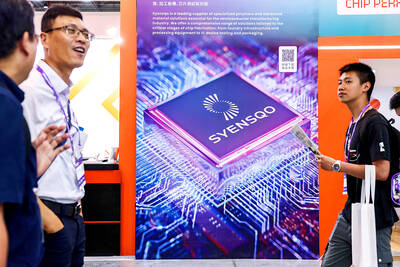Manufacturers in China are increasingly looking to source chips locally because they fear that the US and other governments might prioritize domestic users of the semiconductors vital to national security, a senior executive at Semiconductor Manufacturing International Corp (SMIC, 中芯) said yesterday.
Customers are telling SMIC that they need to secure a certain amount of capacity within China itself because of concerns the industry could become more fragmented, disrupting inflows from abroad, SMIC cochief executive officer Zhao Haijun (趙海軍) said.
Companies in China, where everything from Apple Inc iPhones to Volkswagen AG vehicles are manufactured, have increasingly turned to local component suppliers and assemblers.
“What we can make here is less than 10 percent of what they need. They are worried,” Zhao told analysts on an earnings call. “In the future, we may see that there is an oversupply of chips of certain nodes in some markets, but there will still be a shortage in some other markets.”
Governments from Tokyo to Washington and Brussels are racing to bolster chip ecosystems at home, wary of a heavy reliance on manufacturing in Taiwan and South Korea after a global component shortage affected the auto and electronics industries.
The US has also sought to limit flows of technology to China, which it considers a geopolitical rival, especially if it ends up for military use.
The global shortages have been particularly acute in more mature but traditionally underinvested 28 nanometer to 40 nanometer technologies, common in vehicles and machinery, spurring an aggressive buildup in those areas, including in China. That in turn has spurred fears of a glut.
SMIC intends to spend US$5 billion on upgrades and expansion this year, much of which is to go toward three giant new plants in Shanghai, Beijing and Shenzhen.
SMIC itself has been hit with US sanctions, which the company said has a major impact on its advanced technology development.
Zhao did not identify the customers he was referring to, although the company’s main customers include Datang Telecom Technology Co and Qualcomm Inc, data compiled by Bloomberg showed.
Shares of China’s biggest contract chip manufacturer jumped as much as 4.3 percent in Hong Kong after the company reported net income of US$534 million, beating analysts’ estimates.

SEMICONDUCTOR SERVICES: A company executive said that Taiwanese firms must think about how to participate in global supply chains and lift their competitiveness Taiwan Semiconductor Manufacturing Co (TSMC, 台積電) yesterday said it expects to launch its first multifunctional service center in Pingtung County in the middle of 2027, in a bid to foster a resilient high-tech facility construction ecosystem. TSMC broached the idea of creating a center two or three years ago when it started building new manufacturing capacity in the US and Japan, the company said. The center, dubbed an “ecosystem park,” would assist local manufacturing facility construction partners to upgrade their capabilities and secure more deals from other global chipmakers such as Intel Corp, Micron Technology Inc and Infineon Technologies AG, TSMC said. It

EXPORT GROWTH: The AI boom has shortened chip cycles to just one year, putting pressure on chipmakers to accelerate development and expand packaging capacity Developing a localized supply chain for advanced packaging equipment is critical for keeping pace with customers’ increasingly shrinking time-to-market cycles for new artificial intelligence (AI) chips, Taiwan Semiconductor Manufacturing Co (TSMC, 台積電) said yesterday. Spurred on by the AI revolution, customers are accelerating product upgrades to nearly every year, compared with the two to three-year development cadence in the past, TSMC vice president of advanced packaging technology and service Jun He (何軍) said at a 3D IC Global Summit organized by SEMI in Taipei. These shortened cycles put heavy pressure on chipmakers, as the entire process — from chip design to mass

People walk past advertising for a Syensqo chip at the Semicon Taiwan exhibition in Taipei yesterday.

NO BREAKTHROUGH? More substantial ‘deliverables,’ such as tariff reductions, would likely be saved for a meeting between Trump and Xi later this year, a trade expert said China launched two probes targeting the US semiconductor sector on Saturday ahead of talks between the two nations in Spain this week on trade, national security and the ownership of social media platform TikTok. China’s Ministry of Commerce announced an anti-dumping investigation into certain analog integrated circuits (ICs) imported from the US. The investigation is to target some commodity interface ICs and gate driver ICs, which are commonly made by US companies such as Texas Instruments Inc and ON Semiconductor Corp. The ministry also announced an anti-discrimination probe into US measures against China’s chip sector. US measures such as export curbs and tariffs